#eteokles
Text
obsessively thinking about antigone tonight. queer antigone / antigone as a product of incest displaying incestuous undertones&themes herself / married through death antigone (anouilh’s antigone, who wanted to have her first time with hemon the evening before she goes to bury her brother, who wanted to die not-a-virgin and yet not-a-wife but who didn’t, because they fought instead) / antigone who only knows how to live for oedipus / antigone who only knows how to die for her brothers / antigone who is nothing but her love for her family / antigone who leaves ismene behind / antigone who knows her brothers have been cursed by her father but still goes back to thebes, because she has to / antigone who knows creon will remove the dirt she puts on polyneikes’ body, but still puts it there, because she has to / antigone ready to die, born to die / antigone already dead from the beginning, her fate sealed long ago / antigone leaving thebes as a child knowing she will only come back to die.
#antigone#it’s probably my favorite tragedy#which says a lot because i love many ancient tragedies#but antigone ?#i love her so much#i have so many versions of her story now#plays : sophocles (3 translations including one by anne carson) / anouilh / cocteau#novels : henry bauchau’s oedipus on the road + antigone#and it breaks me every single time#classics#oedipus#jocasta#ismene#eteokles#polyneikes#polynices
43 notes
·
View notes
Text
the fratricide brothers
32 notes
·
View notes
Text
The Kharites (Charities)
The Kharites are goddesses of "grace, beauty, adornment, joy, mirth, festivity, dance and song". There are multiple Kharites in generations, separating them from the older Kharites. The older three Kharites are named Aglaea, Euphrosyne, and Thalia. The younger Kharites presided over many things such as "play, amusement, banqueting, floral decoration, happiness, rest and relaxation". They are all daughters of Zeus and Eurynome.
They had a cult, where they were mainly worshipped in Northern Boiotia and Paros.
In Athens, it is quoted that they were worshipped during the Thesmophoria, which takes place in the month of Pyanepsion, alongside Demeter and Kore (Persephone). (Aristophanes).
In Elis, it is described that in their sculpture, one of them holds a rose, one holds a die, and the other holds a myrtle branch. They are attendants of Hera and Aphrodite, which explains the connection of the rose and the myrtle branch that are also connected to Aphrodite. The die shows that of youth, since it is used by the maiden young.
In Boiotia, it is quoted that the city of Orkhomenos was "The Kharites's city, home of lovely dances." (Pindar) King Eteokles was the first to sacrifice to them, establishing them amongst the city by teaching the custom of their prayer and building their temple.
In Paros, the tradition of sacrificing to them without garlands or flutes was founded by King Minos, who was told of his son's death. He was in the middle of a sacrifice and ripped both of these things away from himself. He completed the ritual, however, which began tradition.
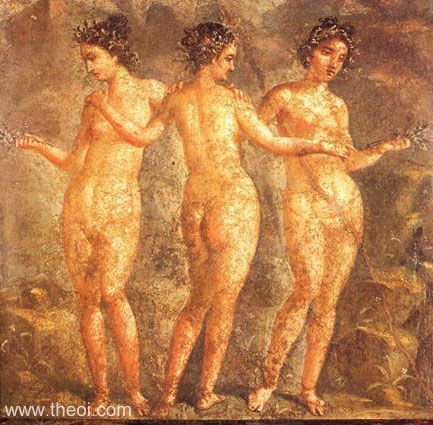
All information is found off theoi.com.
#the kharites#helpol#hellenic polytheism#hellenic pagan#theoi#hellenism#devotional#cult of the theoi series
65 notes
·
View notes
Text
The Lloyd VS Antigone debate is fucking wild as a Ninjago fan studying classics.
Like, I could go on a rant about the definition and requirements of a tragedy, but itʻs changed in definition over time: currently it means a "serious drama with a sorrowful or disastrous conclusion" (Miriam-Webster). But at the time Antigone was written, it was a strict genre with strict conventions. First there would be a prologue where one or more of the characters introduce the situation. Then the introduction of the characters follows, called the parodos. There are three or more episodes after the parodos, interspersed with stasima (choral interludes explaining or commenting on the situation). The tragedy ends in an exodos, one final choral stand.
Imo, the main difference between their stories would be the presence of hope. Ninjago wasnʻt written to be a tragedy, Lloyd is written to go through all of these traumatic events and still make it out alive and fighting. Sophocles didnʻt write Antigone with the intent for her to survive. If you know the story of Oedipos, Antigone takes place after his self-imposed exile. Itʻs an expansion on the Seven Against Thebes, following Polynikes and Eteokles deaths, covering Antigoneʻs (their sister) struggle against her uncle Kreon and the burial (or the lack of) of Polynikes.
So did Lloyd go through more trauma than Antigone? Yes, that boy is fucked up to high hell. BUT his story wasnʻt meant to be tragic, it was meant to inspire hope in the power of friendship or some other cheesy shit. Itʻs just not a proper comparison.
66 notes
·
View notes
Text
1 note
·
View note
Text
Going to have four children just to name them Eteocles, Polynices, Ismene, and Antigone
2 notes
·
View notes
Text
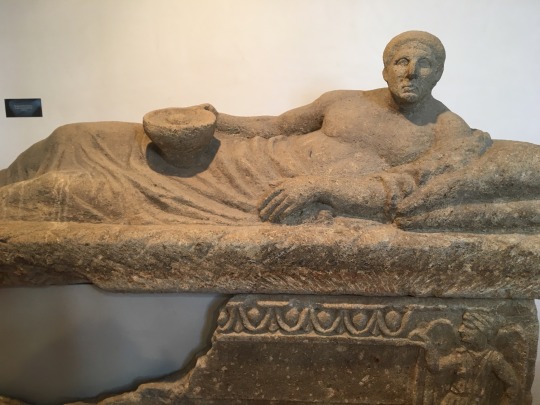
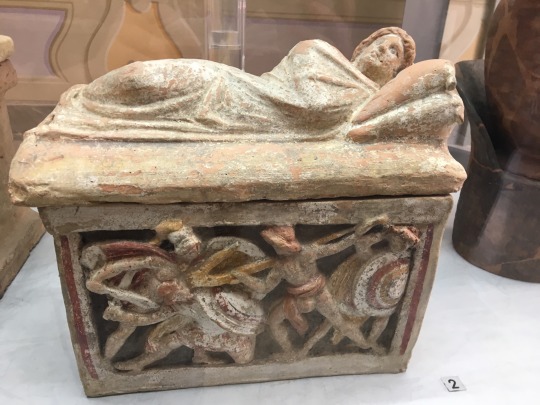

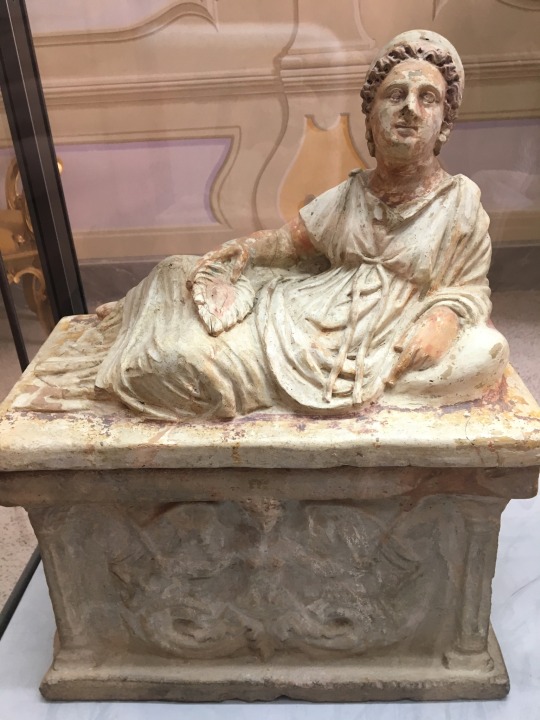
Some beautiful Etruscan cinerary urns from the Etruscan museum in Orvieto! (I’m posting old pics from my Italy trip bc there’s a lot I never did!)
#TUCK ME IN TUESDAY#tagamemnon#etruscans#etruscan art#i think the scene on the first womans urn is eteokles and polyneikes
22 notes
·
View notes
Text
The Kharites
The Kharites are the goddesses of kharis (grace), personal beauty and adornment, and pleasures such as feasting, relaxation, and joy. They are also the goddesses of charming speech and song as well as festive dance and song. They are the attendants of Aphrodite and Hera.
“They are mostly described as being in the service or attendance of other divinities, as real joy exists only in circles where the individual gives up his own self and makes it his main object to afford pleasure to others. The less beauty is ambitious to rule, the greater is its victory; and the less homage it demands, the more freely is it paid. These seem to be the ideas embodied in the Kharites. They lend their grace and beauty to everything that delights and elevates gods and men.” (theoi.com)
This idea of the Kharites giving their grace to others makes sense when you remember the meaning of kharis: a reciprocal relationship with the gods in which mortals make offerings to the theoi.
The Kharites, especially Algaia as the wife of Hephaistos, also represented artistic beauty. Like the Mousai, they were said to have inspired and favored certain artists, and the gracefulness and charm associated with Hermes (words), Peitho (persuasion), Aphrodite and Eros (love), and even Athena (wisdom) is said to come from them. The Kharites were often depicted as companions of Apollon and the Mousai and were said to live with the Mousai on Olympus. Poetry was thought to be their favorite of the arts.
“Poets are inspired by the Muses, but the application of their songs to the embellishment of life and the festivals of the gods are the work of the Kharites.” (theoi.com)
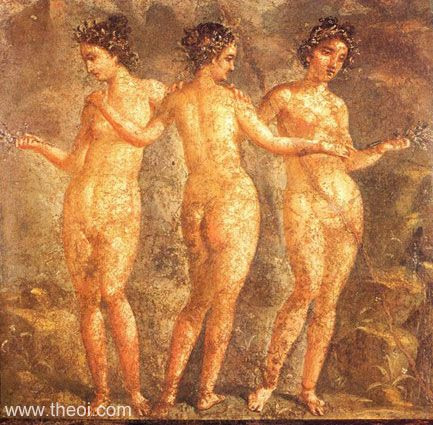
According to Hesiod, the three elder Kharites were daughters of Zeus and the titan-goddess of meadows, Eurynome. Their names were Algaia (sometimes Kharis or Kale/Kalleis), Euphrosyne, and Thaleia.
Algaia was Hephaistos’ second wife and bore by him the younger Kharites: Eukleia, Euthenia, Eupheme, and Philophrosyne. Although not numbered amongst Algaia’s children, Pasithea, the wife of Hypnos, was called a younger Kharis by Homer.
Elder Kharites
Euphrosyne
the goddess of good cheer, mirth, merriment, and joy
her name means “merriment”
Thaleia
goddess of festivity and banquets
her name means “luxurious banquet” or “the blooming”
Thallo, an Hora and goddess of spring buds, was likely confused with Thaleia because of her association with blooming. Thallo herself was more commonly just an epithet of Eirene, one of the Horai and the goddess of peace.
Algaia
youngest of the elder Kharites
goddess of beauty, splendor, glory, and adornment
mother of the younger Kharites by Hephaistos
also called Kharis (grace) or Kale (beauty)
Younger Kharites
Eukleia
goddess of good repute and glory
As Aphrodite’s attendant, she represented a bride’s good repute.
Euthenia
goddess of prosperity and abundance
opposite of Penia (poverty)
Eupheme
goddess of praise, acclamation, and shouts of triumph
opposite of Momos (critique)
Philophrosyne
goddess of friendliness and welcome
Pasithea
goddess of rest and relaxation
Hypnos’ wife and probably the mother of the Oneiroi and Morpheus
She was promised to Hypnos by Hera after he helped her put Zeus to sleep during the Trojan war. Some have interpreted this to mean she is Hera’s daughter. Another source calls her a daughter of Dionysos.
“Pasithea as the wife of Hypnos, god of sleep and dreams, may have been envisaged as the goddess of hallucinations and hallucinogenic drugs. Her name is difficult to translate--the prefix pasis can be translated equally as "all," "possessed," or "acquired" and the suffix -thea as "sight," "seeing," "contemplation," "goddess," or "divine." Translating it as "Acquired-Sight" may suggest a goddess of hallucination, however, in the story of the Iliad, where Hypnos acquires her from Hera in exchange for certain favours, the "Acquired-Goddess" meaning is quite apt. The name pasithea was also given to some unidentified "magical" plant, perhaps even an hallucinogenic. Hypnos was himself associated with poppies and opiates.” (theoi.com)
Other named Kharites
Kharis attendants of Aphrodite depicted in vase painting:
Antheia - goddess of flower wreaths worn at festivals
Eudaimonia - goddess of happiness, prosperity, and opulence
Paidia - goddess of play and amusement
Pandaisia - goddess of rich banquets
Pannykhis - goddess of nighttime festivities
The Spartans worshipped two Kharites they called Kleta and Phaenna. Kleta was a goddess of fame and glory.
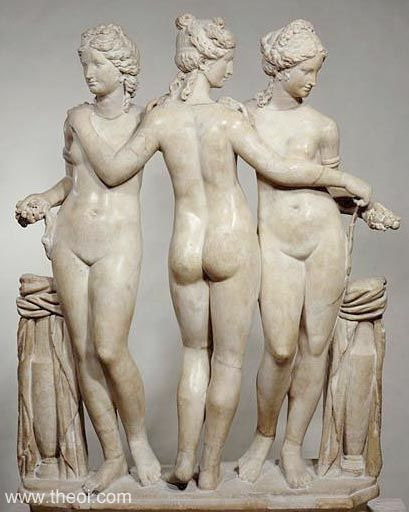
Cult
The main cults of the Kharites were centered in the town of Orkhomenos, Boiotia and the island of Paros.
"The Boiotians say that Eteokles [mythical king of Orkhomenos, Boiotia] was the first man to sacrifice to the Kharites. Moreover, they are aware that he established three as the number of the Kharites, but they have no tradition of the names he gave them.” Pausanias Description of Greece 9. 35. 1
"Minos was told of his son's death while sacrificing to the Kharites on Paros: he ripped the garland from his head and stopped the flute--but even so he completed the ritual, and to this day on Paros they sacrifice to the Kharites without benefit of flutes or garlands." Pseudo-Apollodorus, Bibliotheca 3. 210
"The Lakedaimonians, however, say that the Kharites are two, and that they were instituted by Lakedaimon, son of Taygete, who gave them the names Kleta and Phaenna. These are appropriate names for the Kharites." Pausanias Description of Greece 9. 35. 1
They also had cults at Elis, Olympia, Delphi, Hermione and a few more towns.
In Athens, the Horai Auxo, Thallo, and Carpo were described and worshipped as Kharites.
All info from theoi.com
#kharites#hellenic polytheism#Hellenismos#Hellenic religion#hellenic polythiest#helpol#hellenic worship
140 notes
·
View notes
Photo

Eteokles and Polyneikes, 1730, Giovanni Battista Tiepolo
Medium: oil,canvas
https://www.wikiart.org/en/giovanni-battista-tiepolo/eteokles-and-polyneikes
5 notes
·
View notes
Text
i think that all hell breaks loose part two is an antigone narrative but sort of reversed.
like-- antigone goes against the laws of the land and uses her own law to justify burying her brother. dean goes against everything he knows to be true (and everything his father would have wanted!) and uses his belief that family is more important than anything to justify bringing sam back from the dead.
and while antigone doesn’t have the luxury of bringing her brother back, what she does is the closest thing to it— if polyneikes isn’t buried properly, he won’t be able to get into the afterlife, and so antigone burying him is her ensuring that they will be together in death. dean, conversely, is doing something that he knows full well will result in his death, by selling his soul to save sam, but he’s doing it so that sam can continue to live— essentially ensuring that they will be apart in death (dean in hell and sam in heaven).
and the theme of burial is really interesting, too! you get the sense that when dean refuses to bury sam he is essentially doing what kreon and thebes were doing to polyneikes when they refused to bury him. sam doesn’t have any memory of where he was when he was dead, possibly because he wasn’t granted entry into the afterlife because of dean’s refusal to bury him. dean’s obsessive denial of burying sam is actually what inspired this, because antigone is a narrative about facing death to bury your loved one, and all hell breaks loose is about how dean faces death to raise sam from the dead (a sort of un-burial).
it’s also interesting that the context around antigone is that eteokles and polyneikes (her brothers) both turned against each other - “two brothers are dead by one another’s hands,” which is the opposite (but still remarkably similar) to how dean refuses to kill sam all through season 2.
and we joke and we jest about supernatural being a greek tragedy but... it is! there’s a sense of inevitability about everything that happens— something that’s unavoidable about all the decisions that sam and dean make. and we can see how badly everything’s going to turn out, we all know it, but we keep watching anyway.
#supernatural#antigonick#parallels#o yeah and i didn't even TOUCH 'who can grow me a new brother' which i could write a whole essay on
3 notes
·
View notes
Photo
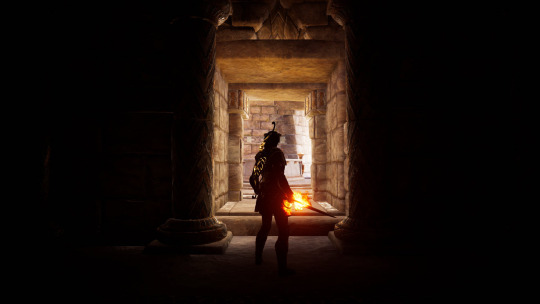
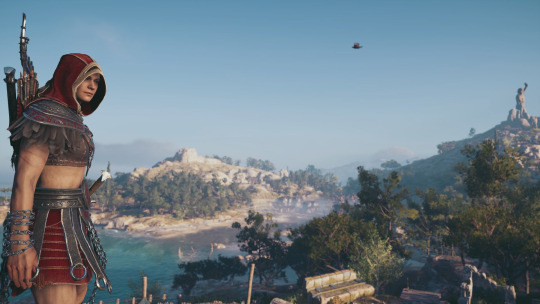

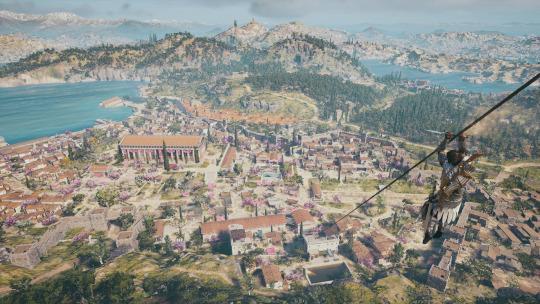
And then started 4th round with Kassandra
無いと想っていた4周目を始めてしまった。もう少し熟練を積みたいスキルがあるのと 3周してきたのに女性主人���としてクリアしたことが一度もない為。実際 我ながら呆れている(笑)。
3周目のプレイ時間は330時間 累計で1200時間に達した。熟練度は現在123だが まだまだ基本的な強化に終始している状態で もっと遊びも採り入れたビルドにしたいところだ。
因みに第一弾DLC『最初の刃の遺産』は 初周で全攻略して以降触っていない。ストーリーに納得出来ない点があり クエストも不快なものが多い 加えて破壊される村があって 攻略後の景観と気分とに障るからだ。当初は未だレベル上限に達していなかった為 報酬として取得するレジェンド装具のレベルも半端だったが アップグレードは3周目までに力押し:鍛冶屋で完了させた。つまり 自分に周回の必要は全くないという次第。
この周では 〝第一文明の石碑〟巡りとメインストーリー『果てなき旅』にのみ焦点を絞り 効率重視で往くつもりでいる。途上で女性専用レジェンド装具:アマゾンセットも初獲得出来るだろう。そこまで廻れば目に映る類のコレクションは完了されているかと想う その上で やはり自分にとっての主人公は男性:アレクシオス故 彼へ戻っての5周目(以降?!)を以て締めくくりとしたい。
19 notes
·
View notes
Text
when i grow up i want to be an etruscan cinerary urn
#specifically one w a scene of eteokles and polyneikes' fratricidal duel to the death on it#fetid stone a bonus also#beeps
29 notes
·
View notes
Text
Efemeryda
Kochać można kogoś tylko na chwilę, w pewnym miejscu i w określonym czasie. Jeżeli godzimy się ze stwierdzeniem, że człowiek nieustannie się zmienia i jest sumą doświadczeń, związków, uniesień; wypadkową wyciągniętą ze spontanicznych wycieczek nad jezioro, nieprzespanych nocy, wypitych butelek zbyt cierpkiego wina i rozbitych talerzy, musimy godzić się z tym, że po piętnastej butelce i czwartej dzikiej plaży nie możemy kochać tych samych, obejmujących w nocy ramion. Miłość nie trwa wiecznie i nie ma w tym ziarna plugawości i przereklamowanego cynizmu.
Jako szesnastolatka kochałam platonicznie najmądrzejszego chłopca w klasie i wierzyłam, że do końca świata będę wzdychać do jego zdań wypowiadanych na polskim. Skąd on to wszystko wiedział? Wiedział, że to Eteokles złamał antyczną obietnicę, a na biologii podpisywał się znajomością anatomii wielorybów. Na szczęście później zrozumiałam, że nie kocha się kogoś za to, że wie, że Płetwal Błękitny osiąga do trzydziestu trzech metrów. Natomiast w tamtym momencie byłam zakochana i wierzyłam, że już zawsze tak będzie.
Miłości i miłostki uczą nas tego, że można przeżyć z kimś najpiękniejszą jesień, już nigdy się nie spotkać i żyć wspomnieniem przepychanek o koc w pierwszą chłodną noc. Pamiętać o rozgotowanym makaronie, kiedy chcemy popisać się zdolnościami kulinarnymi. Pielęgnować i odświeżać w pamięci wszystkie niewinne pocałunki w czoło, którymi obdarowywank nas w półśnie. A potem przyjdzie zima i kolejna miłość zaskoczy nas tym, że w imię uczucia będzie za nami biec w krótkich spodenkach i koszulce od piżamy, gdy będziemy odchodzić na wiosnę.
Na imię nam Efemeryda.
2 notes
·
View notes
Photo
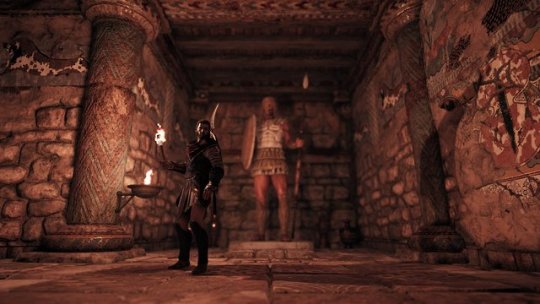
Tomb of Eteokles
2 notes
·
View notes
Text
Did anyone else... just have some wolves in the Tomb of Eteokles?
Doesn't seem like that was supposed to happen...
1 note
·
View note
Text
What’s in this blog + a note
Title of play: Antigone, Author: Sophocles , Translator: Anne Carson, Reprinted in 2016.
What’s in this blog?
1. storyboard
2. Antigone’s family tree
3. Some historical context about the play Antigone and its author
4. How Antigone conforms to Aristotle’s elements of tragedy ( Is Antigone a Greek tragedy?)
5. A list of the play’s major themes
6. A list of 6-8 study questions
7. 4-5 outside resources about the play (sculpture, painting, music etc.)
8. critical scholarship about the play
9. My response to Antigone
Note: I read The translated version of Antigone that was by Sophokles and translated by Anne Carson. In this translation she spells the names Kreon, Eurydike, Eteokles and Polyneikes with a “k” instead of a “c” both ways are right it just depends on what ones you are reading. The name Haimon can also be spelled Haemon.
1 note
·
View note